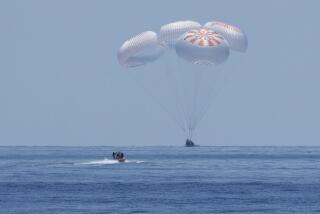Galileo on Perfect Course; Shuttle Has Cooling Trouble
HOUSTON â The Galileo spacecraft was speeding along Thursday toward its eventual rendezvous with Jupiter, following a course so perfect that ground controllers will not have to make even a minor adjustment for at least 20 days.
âItâs doing good,â said Ron Dittemore, a shuttle flight director at the Johnson Space Center.
However, the ghost of Galileo lingered aboard the shuttle Atlantis, which sent the 3-ton spacecraft speeding on its historic expedition six hours after the shuttle was launched Wednesday from the Kennedy Space Center. It seems that Galileoâs controversial nuclear generators may have temporarily messed up the air conditioning system in the crewâs quarters.
The five astronauts aboard the Atlantis were alternately either a little too cool or a little too warm during their first day on orbit, Dittemore said.
âWeâre trying to find a happy medium,â he said at a press briefing here.
Galileo carries about 48 pounds of plutonium, which gives off heat as it goes through radioactive decay. The heat, in turn, is converted to electricity to run the craftâs many scientific instruments.
While it was nestled in the Atlantisâ cargo bay, excess heat was removed from Galileo by a cooling loop containing water, Dittemore said. The cooling loop was integrated into the shuttleâs âtotal cooling system,â he said, and it apparently added more heat than had been expected.
That caused condensation in one of the cooling and heating ducts, which promptly turned to ice and blocked the system. The ice was eventually melted, but the temperature in the shuttleâs cabin remained a bit chilly--in the low 70s--Thursday.
Galileo, meanwhile, was more than 200,000 miles away from Earth on Thursday. Its speed, relative to Earth, was 9,400 m.p.h.--slightly more than half of the orbiting speed of the shuttle.
With their primary mission already accomplished, the five astronauts aboard the Atlantis spent Thursday taking photographs of Earth in a program designed to examine trouble spots in the planetâs environment, such as deforestation in the Brazilian rain forest. In addition, they activated a number of experiments, including one that will study the damage to the ozone layer that protects Earth from the sunâs harmful ultraviolet rays.
The shuttle is scheduled to land Monday at Edwards Air Force Base in Southern California at 12:38 p.m.
Navy Capt. Donald E. Williams, 47, is the commander of the Atlantis. The other members of the crew are Michael J. McCulley, 46, the pilot, and Shannon W. Lucid, 46, Franklin Chang-Diaz, 39, and Ellen S. Baker, 36.
More to Read
Sign up for Essential California
The most important California stories and recommendations in your inbox every morning.
You may occasionally receive promotional content from the Los Angeles Times.








